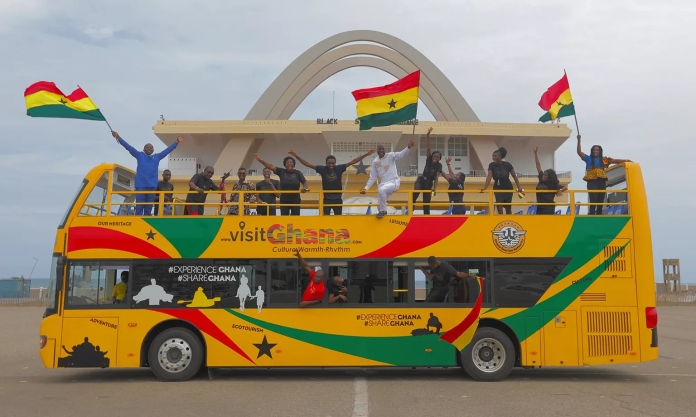Friday marks World Tourism Day, and Ghana has plenty to celebrate. New government figures show international visitors pumped a massive GHS15.42 billion into the economy – yet most Ghanaians can’t afford to explore their own country because hotels charge what tourists pay.
Here’s the irony: while Ghana welcomes record numbers of international visitors, accommodation costs have soared to nearly $500 per week, pricing out locals who might spend a weekend discovering their heritage sites.
The Ghana Statistical Service (GSS) dropped some eye-opening numbers this week. Between late 2022 and September 2023, overnight tourists – who made up 98.6% of all visitors – spent GHS15.18 billion. Day-trippers added another GHS24 million. These are the first official figures showing just how much tourism means to Ghana’s wallet.
Things are picking up steam too. August alone brought 112,000 passengers through Ghana’s airports. Cape Coast’s slave forts draw visitors from around the world, Kakum’s canopy walks thrill adventure seekers, and Accra’s festivals showcase culture that tourists can’t find anywhere else.
But here’s where it gets complicated. Those same hotel rates that international visitors happily pay – around ₵700 per night for regular hotels, ₵300-400 for budget options – put domestic tourism out of reach for many Ghanaians. A simple three-day getaway becomes a serious financial commitment.
The numbers tell an uncomfortable story. Tourism revenue surged, passenger arrivals climbed, yet domestic tourism managed just 19% growth in 2024 despite obvious local interest. Something doesn’t add up.
Think about what Ghana’s missing out on. Domestic tourists don’t need flights, don’t require visa processing, and travel year-round instead of following seasonal patterns. They’d visit family, explore different regions, and spend money in local communities that international tourists might never reach.
“The untapped domestic market represents more than just economic potential,” industry watchers often say, and they’re right. Local travelers would strengthen supply chains, support small businesses, and create jobs in every region. More importantly, Ghanaians would discover their own country’s incredible diversity.
The problem runs deeper than expensive hotels. Roads to tourist sites need work, attractions lack proper maintenance, and traffic around Accra can kill any weekend travel plans. Add relatively low average incomes, and domestic tourism becomes a luxury most families skip.
Meanwhile, international tourists keep coming because Ghana delivers exactly what they’re seeking – authentic African culture, historical significance, and hospitality that makes visitors feel welcome. The country has successfully positioned itself as West Africa’s cultural hub, and the investment in that reputation is paying off.
The accommodation sector reflects this focus. Hotels cater to international standards and charge accordingly, creating a two-tier system where world-class facilities serve overseas visitors while locals search for affordable alternatives that barely exist.
Regional competition makes this domestic market gap more concerning. As neighboring countries develop their tourism offerings, Ghana needs every advantage it can find. A strong domestic base would provide stability when international travel faces disruptions – something the pandemic taught everyone about tourism’s volatility.
Government data shows overnight visitors heavily outspend day-trippers, suggesting longer stays generate more economic impact. Domestic tourists could follow similar patterns if accommodation costs weren’t so prohibitive. Weekend trips could become week-long vacations if the pricing made sense.
Infrastructure improvements would benefit everyone. Better roads to Kakum, improved facilities at Elmina Castle, and reduced traffic congestion around major attractions would enhance experiences for international and domestic visitors alike. The question is whether Ghana can balance premium international appeal with domestic accessibility.
Some solutions seem obvious. Mid-range hotels targeting local travelers, tourism packages designed for Ghanaian budgets, and promoting secondary destinations beyond Accra and Cape Coast could open up domestic market potential.
World Tourism Day celebrations this year highlight both achievement and opportunity. Ghana has built an impressive international tourism sector that generates billions and employs hundreds of thousands. The next challenge involves ensuring Ghanaians can participate in exploring their own remarkable country.
The irony shouldn’t be lost: Ghana markets itself globally as a destination where visitors can connect with African heritage and culture, yet many Ghanaians can’t afford to experience these same attractions. Solving this contradiction could unlock tourism’s full potential while ensuring the benefits reach every corner of the country.
Source: newsghana.com.gh











